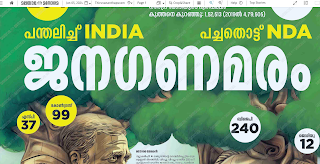25 commandements for journalists from Tim Radford, former Guardian science editor, letters editor, arts editor and literary editor. Excellent stuff.
"Mobile number portability (MNP), which allows customers to switch service providers without changing their cell number, will be available across India from Thursday (January 20)," says The Telegraph daily. The question is who will gain the most if people change their service providers in large numbers. "More than one out of six mobile phone subscribers (17.6%) want to switch over to another telecom company," says The Hindustan Times. Business Standard says that if the service providers tweak their plans, customers may be the winners.
I wonder what will happen if the same is done for DTH services. Because DTH subscribers are the most unhappy lot, compared to mobile subscribers.
Deadly Congo fever virus surfaces in India, reports The Telegraph. The Indian Express says, "A six-member team from the National Centre for Disease Control...will visit Gujarat to investigate the prevalence of Crimean Congo Hemorrhagic fever (CCHF)."
Accelerated melting of sea-ice over the coming decades will release more mercury into the environment, says a study. At present, the absence of sunlight prevents the chemical degradation of the heavy metal element.

